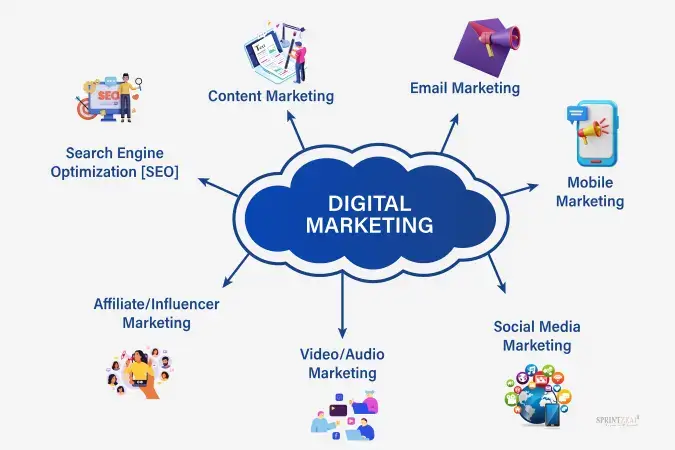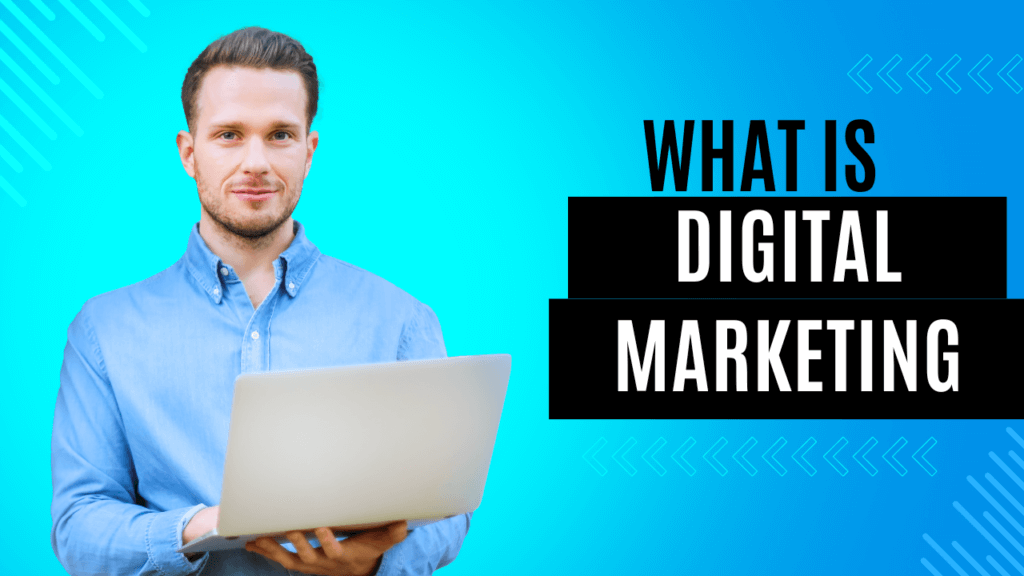What is Digital Marketing. In the digital age, marketing has evolved beyond traditional print ads, billboards, and TV commercials. Digital marketing has emerged as a crucial component for businesses aiming to reach a broader audience, engage with customers, and drive sales. With over 4.9 billion internet users globally, the potential of digital marketing is immense. This blog explores the various facets of digital marketing, its benefits, and strategies for businesses to thrive in the digital realm.
Understanding Digital Marketing
Digital marketing refers to the use of digital channels, such as search engines, social media, email, and websites, to promote products or services. Unlike traditional marketing, digital marketing allows for real-time interaction and personalized communication with the target audience. It encompasses a wide range of tactics and strategies, including:
- Search Engine Optimization (SEO): Enhancing a website’s visibility on search engines like Google to attract organic traffic.
- Content Marketing: Creating valuable and relevant content to attract and engage a target audience.
- Social Media Marketing: Utilizing social media platforms like Facebook, Instagram, and Twitter to promote products and engage with customers.
- Email Marketing: Sending targeted emails to nurture leads and build customer relationships.
- Pay-Per-Click (PPC) Advertising: Running ads on search engines and social media platforms where advertisers pay for each click.
- Affiliate Marketing: Partnering with other businesses or influencers to promote products and share revenue.
- Influencer Marketing: Collaborating with influencers to reach a larger audience and build brand credibility.

The Benefits of Digital Marketing
Digital marketing offers numerous advantages over traditional marketing methods. Here are some key benefits:
- Cost-Effectiveness: Digital marketing campaigns can be more affordable than traditional advertising methods, offering a better return on investment (ROI).
- Global Reach: Businesses can reach a global audience through digital channels, breaking geographical barriers.
- Targeted Advertising: Advanced targeting options allow businesses to reach specific demographics, interests, and behaviors, ensuring ads are seen by the most relevant audience.
- Measurable Results: Digital marketing provides detailed analytics and metrics, enabling businesses to track the performance of their campaigns and make data-driven decisions.
- Real-Time Interaction: Businesses can engage with their audience in real-time through social media, live chats, and email, fostering stronger customer relationships.
- Personalization: Digital marketing allows for personalized communication, enhancing customer experience and increasing conversion rates.
Key Digital Marketing Strategies

To harness the power of digital marketing, businesses need to implement effective strategies tailored to their goals and target audience. Here are some essential strategies:
- Develop a Strong Online Presence
A robust online presence is the foundation of any successful digital marketing campaign. This includes having a well-designed, user-friendly website optimized for search engines. A blog with valuable content can drive organic traffic and establish the business as an authority in its industry.
- Leverage Social Media
Social media platforms are powerful tools for engaging with customers and promoting products. Businesses should identify the platforms most frequented by their target audience and create compelling content to share. Regular posts, interactive stories, and live videos can boost engagement and brand awareness.
- Invest in SEO
Search Engine Optimization (SEO) is crucial for improving a website’s visibility on search engines. By optimizing website content with relevant keywords, creating high-quality backlinks, and ensuring a mobile-friendly design, businesses can attract more organic traffic and rank higher in search engine results pages (SERPs).
- Utilize Email Marketing
Email marketing remains one of the most effective digital marketing strategies. By building a mailing list and sending personalized, value-driven emails, businesses can nurture leads, promote products, and maintain customer loyalty. Segmented email campaigns ensure that messages are tailored to the interests and behaviors of different audience segments.
- Implement PPC Advertising
Pay-Per-Click (PPC) advertising can drive immediate traffic and sales. Platforms like Google Ads and social media channels offer PPC options where businesses pay only when users click on their ads. Well-crafted ad campaigns with targeted keywords and compelling ad copy can yield significant returns.
- Create High-Quality Content
Content marketing is at the heart of digital marketing. Creating informative, entertaining, and valuable content attracts and engages the audience. This includes blog posts, videos, infographics, podcasts, and social media content. Consistent content creation establishes brand authority and keeps the audience coming back for more.
- Embrace Video Marketing
Video content is highly engaging and can effectively convey a brand’s message. Platforms like YouTube, Instagram, and TikTok are ideal for sharing video content. Businesses can create product demos, tutorials, customer testimonials, and behind-the-scenes videos to connect with their audience.
- Use Influencer Marketing
Collaborating with influencers can amplify a brand’s reach and credibility. Influencers have established trust with their followers, and their endorsements can significantly impact purchasing decisions. Businesses should identify influencers whose audience aligns with their target market and build authentic partnerships.
- Optimize for Mobile
With the increasing use of smartphones, optimizing digital marketing efforts for mobile devices is essential. This includes having a mobile-friendly website, creating mobile-optimized content, and ensuring seamless user experiences across all devices.
- Analyze and Adapt
Continuous monitoring and analysis of digital marketing campaigns are crucial for success. Tools like Google Analytics, social media insights, and email marketing software provide valuable data on campaign performance. Businesses should regularly review this data, identify areas for improvement, and adapt their strategies accordingly.
The Future of Digital Marketing
As technology continues to evolve, so will digital marketing. Here are some trends shaping the future of digital marketing:
- Artificial Intelligence (AI): AI-powered tools can analyze data, predict customer behavior, and personalize marketing efforts. Chatbots and virtual assistants enhance customer service and engagement.
- Voice Search Optimization: With the rise of voice-activated devices like Amazon Echo and Google Home, optimizing content for voice search is becoming essential.
- Augmented Reality (AR) and Virtual Reality (VR): AR and VR offer immersive experiences, allowing customers to visualize products before purchasing. These technologies are transforming how businesses engage with their audience.
- Personalization and Customer Experience: Personalized marketing and exceptional customer experiences will remain paramount. Businesses that prioritize customer-centric approaches will stand out in a crowded digital landscape.
- Social Commerce: Social media platforms are integrating e-commerce features, allowing users to shop directly from their feeds. Social commerce is expected to grow, making it easier for businesses to sell products through social media.
- Sustainability and Ethical Marketing: Consumers are increasingly conscious of sustainability and ethical practices. Businesses that align their marketing with social and environmental responsibility will build stronger connections with their audience.
Conclusion
Digital marketing has revolutionized how businesses reach and engage with their customers. By leveraging digital channels and implementing effective strategies, businesses can achieve remarkable growth and success. As technology advances, staying updated with the latest trends and continuously adapting to the evolving digital landscape will be crucial. Embracing the power of digital marketing is not just an option but a necessity for businesses aiming to thrive in the modern business world.
The Power of Digital Marketing: Transforming the Modern Business Landscape
In today’s fast-paced digital era, businesses must adapt to the ever-changing landscape to remain competitive. One of the most significant shifts in recent years has been the rise of digital marketing. This comprehensive guide delves into the essence of digital marketing, the role of a digital marketing agency, and why investing in the best digital marketing strategies can propel your business to new heights. Welcome to Yashpal.in, where we help you navigate the digital world and harness its potential.
What is Digital Marketing?
Digital marketing refers to all marketing efforts that utilize the internet and electronic devices. Businesses leverage digital channels such as search engines, social media, email, and websites to connect with current and prospective customers. Unlike traditional marketing, digital marketing allows for real-time interaction and personalized communication, making it an indispensable tool for businesses today.
The Role of a Digital Marketing Agency
A digital marketing agency specializes in creating and executing marketing strategies tailored to the online world. These agencies bring expertise, tools, and resources that may not be available in-house. They handle everything from SEO and content marketing to PPC and social media campaigns, ensuring that your brand reaches the right audience at the right time. By partnering with a digital marketing agency like Yashpal.in, businesses can focus on their core operations while experts drive their online growth.
Benefits of Digital Marketing
- Cost-Effectiveness: Digital marketing is often more affordable than traditional marketing methods. Techniques such as SEO, content marketing, and social media advertising offer a higher return on investment (ROI) and are accessible even to small businesses.
- Global Reach: With digital marketing, geographic barriers are a thing of the past. You can reach a global audience with a well-executed online campaign, expanding your market beyond local confines.
- Targeted Advertising: Advanced targeting options allow businesses to reach specific demographics, interests, and behaviors. This precision ensures that your marketing efforts are directed at those most likely to convert into customers.
- Measurable Results: Digital marketing provides detailed analytics and metrics, enabling businesses to track the performance of their campaigns. Tools like Google Analytics and social media insights offer valuable data to inform future strategies.
- Real-Time Interaction: Social media platforms and live chat features enable businesses to engage with their audience in real-time, fostering stronger customer relationships.
- Personalization: Digital marketing allows for personalized communication, enhancing customer experience and increasing conversion rates. Tailored content and offers based on user behavior and preferences are more likely to resonate with your audience.
Key Digital Marketing Strategies
- Search Engine Optimization (SEO): SEO is the practice of optimizing your website to rank higher in search engine results pages (SERPs). By improving your site’s visibility on search engines like Google, you can attract more organic traffic. This involves keyword research, on-page optimization, technical SEO, and building high-quality backlinks.
- Content Marketing: Content is king in the digital world. Creating valuable, relevant, and consistent content attracts and engages your target audience. Blog posts, videos, infographics, and podcasts are just a few forms of content that can drive traffic and build brand authority.
- Social Media Marketing: Social media platforms are powerful tools for promoting your brand and engaging with customers. Identifying the right platforms for your audience and creating compelling content can boost your online presence. Regular posts, interactive stories, and live videos are effective ways to engage your audience.
- Pay-Per-Click (PPC) Advertising: PPC advertising involves paying for each click on your ads. Platforms like Google Ads and social media channels offer PPC options where businesses can run targeted ad campaigns. A well-crafted PPC campaign with relevant keywords and compelling ad copy can yield significant returns.
- Email Marketing: Email marketing remains one of the most effective digital marketing strategies. Building a mailing list and sending personalized, value-driven emails can nurture leads, promote products, and maintain customer loyalty. Segmented email campaigns ensure that messages are tailored to different audience segments.
- Affiliate Marketing: This strategy involves partnering with other businesses or influencers to promote your products. Affiliates earn a commission for driving sales, making it a cost-effective way to expand your reach and boost sales.
- Influencer Marketing: Collaborating with influencers can amplify your brand’s reach and credibility. Influencers have established trust with their followers, and their endorsements can significantly impact purchasing decisions. Authentic partnerships with influencers whose audience aligns with your target market can be highly effective.
- Video Marketing: Video content is highly engaging and can effectively convey your brand’s message. Platforms like YouTube, Instagram, and TikTok are ideal for sharing video content. Product demos, tutorials, customer testimonials, and behind-the-scenes videos can connect with your audience on a deeper level.
- Mobile Optimization: With the increasing use of smartphones, optimizing your digital marketing efforts for mobile devices is essential. This includes having a mobile-friendly website, creating mobile-optimized content, and ensuring seamless user experiences across all devices.
- Analytics and Adaptation: Continuous monitoring and analysis of your digital marketing campaigns are crucial for success. Tools like Google Analytics provide valuable insights into campaign performance. Regularly reviewing this data helps identify areas for improvement and adapt your strategies accordingly.

Why Choose Yashpal.in for Digital Marketing?
At Yashpal.in, we understand the intricacies of digital marketing and offer tailored solutions to meet your business needs. Our team of experts is dedicated to helping you achieve your marketing goals through innovative strategies and cutting-edge technology. Here’s why you should choose us:
- Expertise: With years of experience in the digital marketing industry, our team brings unparalleled expertise to the table. We stay updated with the latest trends and best practices to ensure your business stays ahead of the competition.
- Customized Solutions: We don’t believe in a one-size-fits-all approach. We take the time to understand your business, target audience, and marketing goals to create customized strategies that deliver results.
- Transparency: We believe in transparency and keep you informed at every step of the process. Our detailed reports and regular updates ensure you are always in the loop.
- Results-Driven Approach: Our focus is on delivering measurable results. We use data-driven insights to optimize your campaigns and achieve the best possible outcomes.
- Comprehensive Services: From SEO and content marketing to social media and PPC advertising, we offer a full range of digital marketing services to meet all your needs.
The Future of Digital Marketing
As technology continues to evolve, so will digital marketing. Here are some trends shaping the future of digital marketing:
- Artificial Intelligence (AI): AI-powered tools can analyze data, predict customer behavior, and personalize marketing efforts. Chatbots and virtual assistants enhance customer service and engagement.
- Voice Search Optimization: With the rise of voice-activated devices like Amazon Echo and Google Home, optimizing content for voice search is becoming essential.
- Augmented Reality (AR) and Virtual Reality (VR): AR and VR offer immersive experiences, allowing customers to visualize products before purchasing. These technologies are transforming how businesses engage with their audience.
- Personalization and Customer Experience: Personalized marketing and exceptional customer experiences will remain paramount. Businesses that prioritize customer-centric approaches will stand out in a crowded digital landscape.
- Social Commerce: Social media platforms are integrating e-commerce features, allowing users to shop directly from their feeds. Social commerce is expected to grow, making it easier for businesses to sell products through social media.
- Sustainability and Ethical Marketing: Consumers are increasingly conscious of sustainability and ethical practices. Businesses that align their marketing with social and environmental responsibility will build stronger connections with their audience.
Conclusion
Digital marketing is a powerful tool that can transform your business. By leveraging digital channels and implementing effective strategies, businesses can achieve remarkable growth and success. At Yashpal.in, we are committed to helping you navigate the digital world and harness its potential. Embrace the power of digital marketing today and take your business to new heights.


Hi, this is a comment.
To get started with moderating, editing, and deleting comments, please visit the Comments screen in the dashboard.
Commenter avatars come from Gravatar.